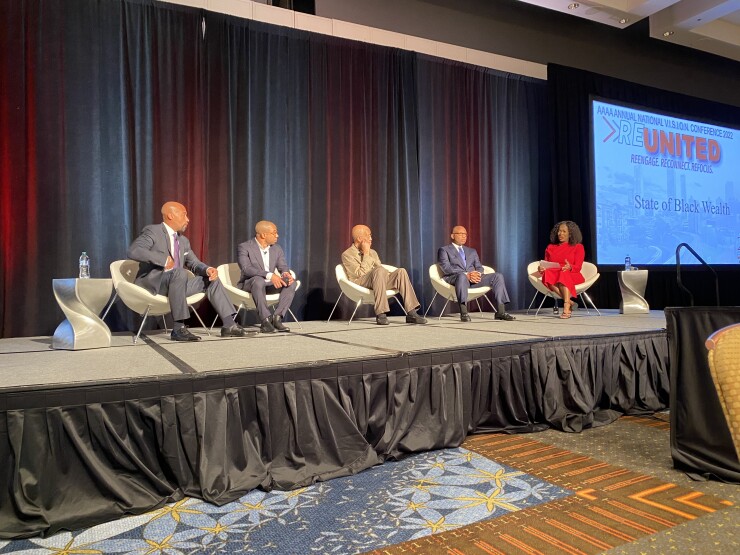Financial advisors can help close the country's racial wealth gap gradually by changing the conversations about money among Black Americans and other minorities.
That was the key takeaway from a panel of five Black experts speaking on Tuesday at the annual Vision conference held by the Association of African American Financial Advisors, which goes by the nickname "Quad-A." Panelists including an advisor, a bank CEO, an educator, an insurance executive and a financial journalist
Despite some success stories, the current net worth of Black and Hispanic individuals as compared to that of white Americans remains starkly low. An average household among those groups has about half the income of a white household and roughly 15% to 20% of the net wealth,
When Quad-A founder LeCount Davis started his practice in 1970, his clients were relatively wealthy but "they were spending more than they were making," he said. "I don't get wrapped up in somebody making far more money than I do, I did or my clients," he added. "You've got to improve your situation on a regular basis."
To Davis, that means saving and investing under a financial plan with an emphasis on educating your descendants about money. For many Americans, though, talking about money proves difficult given the trauma and
Kelly, who is also the author of a
"Even as you're talking with your kids, talk to them about what are your assets and what are your liabilities that equal your net worth," said Kelly. "Until we start having this conversation and making it a part of our daily language, we're not going to change the behaviors that are going to get to the point of closing that gap."
Other late famous figures offer contrasting stories that can help advisors and other financial professionals communicate that message, said Eugene Mitchell. He
"His wife just bought a $2 million home in L.A., his business was able to be continued, so what he did was a model that we can follow," he said. "We want to also showcase these success stories."
Groups such as Quad-A carry the potential to alter typical narratives about wealth by advocating for financial literacy, according to Courtney Gray, the founder of Historically Black Colleges and University nonprofit internship organization
"To really be effective in lobbying, it has to be us here," Gray said. "It has to be the churches. It has to be the institutions. It has to be the corporations. So we always need to come together as a community, and I think up until this point, everything has been pretty much segmented in terms of our approach."
Advisors can encourage that learning by talking with clients about the meaning of wealth and what it could mean for families in everyday life. The panel's moderator, former Bloomberg Radio and TV correspondent
"Wealth is agency," she said. "The agency over your time, the agency over your resources, but also the agency to be able to cover an emergency, to be able to invest more aggressively, to be able to bring in multiple streams of income."
Over time, those discussions about money and wealth could lead to there being more Black Americans building riches on the level of Warren Buffett and Bill Gates, according to Davis. The organization's founder earned loud applause from the room full of Black advisors at the Hyatt Regency in Downtown Atlanta by relating the story of one of his many media appearances.
"I remember being on a program when somebody said, 'Well, how many Black billionaires do you have in this country?'" Davis said. "I said, 'It doesn't make any difference to me, because if you can name them, that means you don't have enough.'"









